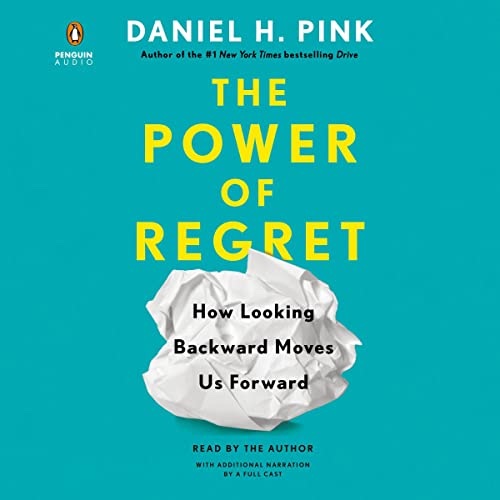
The Power of Regret: How Looking Backward Moves Us Forward by Daniel Pink deals with the power we can draw from dealing with our regrets in a thoughtful manner. Regrets deal with things you can control so you need to take action when possible to make things better and move on from things that can’t be fixed. Research shows that people who do this are healthier and happer. Thanks, Dan for this vital life lesson.
Part One. Regret Reclaimed – 1. The Life-Thwarting Nonsense of No Regrets
- Fron popular songs to literature to advice columns we hear over and over again about how successful people supposedly have no regrets. In this book, Pink shows not only that this is wrong-headed thinking, but when properly used, analysis of your regrets can serve to improve your life. We all have a portfolio of emotions and most of us try to have a bias in our lives for positive ones. That makes sense, but we also need to deal with negative emotions to help us avoid harm, be it physical or emotional. The purpose of this book is to show you how to use regret’s many strengths to make better decisions, perform better at work, and bring greater meaning to your life. Pink draws on his analysis of two massive surveys to accomplish this goal.
2. Why Regret is Human
- Regret is the unpleasant feeling associated with some action or inaction a person has taken which has led to a state of affairs that the person wishes were different. It is more understood as a process than a thing. As we mature, our brains naturally develop to experience regret. It is associated with the orbitofrontal cortex. People with lesions in this area typically do not experience regret. The same is true for people with Huntington’s and Parkinson’s disease. Reget is the most common negative emotion as things you regret are your own fault. They are things where you had control and constantly involve some comparison.
3. At Least’s and If Only’s
- These are two types of counterfactuals. When you think at least, you are thinking about how things could have been worse. When you think if only, you are thinking that an outcome could have been better if you had done something different. Most people engage in if only thinking much more than at least thinking. If only thinking degrades our feelings now, but it can improve our lives later. This is one way regret can help us do better tomorrow.
4. Why Regret Makes Us Better
- If you actively regret something you are not likely to do it again. A central finding is that regret can deepen persistence, which almost always elevates performance. Even thinking about other people’s regrets may confer a performance boost. Regret, however, does not always elevate performance. Lingering on regret for too long can have the opposite effect. Setbacks can supply fuel for future performance. Making mistakes and learning from them via regret is a path to growth.
- When it comes to things you regret it is key that you not wallow in them or dodge them altogether. Doing so will just make things worse. These feelings should result in thinking that results in future action that makes things better or avoids further pain. Think of this action as an evaluation that can be instructive. In short, if you make a mistake you need to ask yourself “what can I learn from it.” (Doug: This is a guiding principle for me.)
DrDougGreen.com If you like the summary, buy the book





